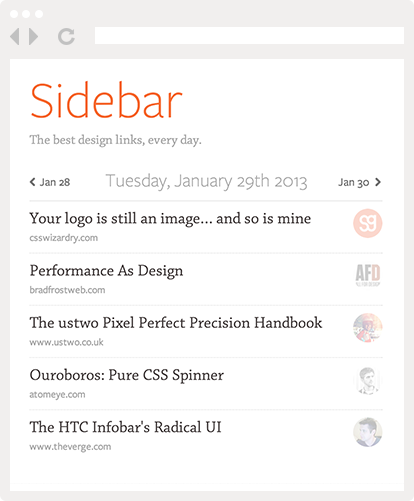One of the first things they teach you at design blogger school is that every blogging designer without exception must one day blog about skeuomorphism.
So here I go.
I would like to clarify three things:
- There’s nothing wrong with skeuomorphism in itself
- Apple knows what they’re doing
- A leather-textured clock app is not skeuomorphism (it’s just bad taste)
There’s nothing wrong with skeuomorphism
Saying that “skeuomorphism is bad design” would be like saying that “purple is an ugly color” or “ellipses have no place in web apps”. It simply doesn’t mean anything.
Skeuomorphism is a design technique like any other, and like any other it can be misused. Just because it’s overused right now doesn’t mean there’s anything wrong with it.
A good comparison might be Lobster, the omnipresent logo font. I would honestly rather use Comic Sans than Lobster in my designs, but that’s no fault of poor Lobster: it’s just so overused right now that using it looks cliché and unimaginative.
If you want to see good skeuomorphism in use, look no further than the slight gradient on most buttons around the web that simulates a raised surface, or even the fact that textfields traditionally have a white background to recall a sheet of paper.
Apple knows what they’re doing

Find My Friends on iPad
Stop complaining about Apple’s contacts app or Find My Friends. Could these apps be done better? Sure. But their current skeuomorphic designs accomplish a couple important things:
- It helps tell these apps apart (“Find My Friends? Oh, right, the one with leather!”).
- It makes the apps more approachable (“Hmm, this looks just like my real-world address book, it can’t be much harder to use”).
- It gives Apple apps (and actually, iOS apps in general) a distinctive style (of course, that style will probably seem retro and kitsch in a couple years).
I’m not saying Apple is without fault. Just that their design choices are not without reasons, and it’s pointless to criticize one without talking about the other.
Actually, this isn’t even skeuomorphism
A skeuomorph is “a derivative object that retains ornamental design cues to a structure that was necessary in the original“.

Skeuomorphism
So a weather app with a picture of a glass thermometer is skeuomorphic: the glass was necessary in the original (the real-world thermometer) but becomes purely ornamental in the new design.
An iPhone app with leather textures and a space background is not skeuomorphic. First of all there is no “original” to speak of here, and even if there were I strongly doubt that “original” included a space-time portal to outer space.
So:
- Glass thermometer iPhone app: skeuomorphic.
- Wooden thermometer iPhone app: not skeuomorphic, because real thermometers do not use wood.
Does that mean a wooden thermometer is a great idea? No! It’s still a horrible idea! Not because it’s skeuo-whatever, but because it’s mixing metaphors.
Mixing metaphors is the opposite of skeuomorphism. It’s a design clue to something that was completely unnecessary in the original, or even didn’t exist at all.
But just like skeuomorphism, mixing metaphors can be used to great effect if you know what you’re doing.
For example, using wooden textures in your app can be a great way to call attention to an element or give your design a distinctive style, precisely because a wooden texture feels out-of-place on a screen.
This may seem like a pointless debate about obscure design terms, but… wait, actually, it is a pointless debate about obscure design terms.
Well, in any case I better go back to working on my upcoming leather-textured, wood-paneled, hand-stitched weather app. Those things don’t design themselves!



Pingback: Speciale presentazione iPhone 5 e iOS 6 | Digitalia - Notizie di tecnologia
Pingback: What is skeuomorphism? - tommytheblog
Pingback: Scheuomorfismo « Massimiliano Bigatti
Pingback: Skeuomorfismo...Skeuo cosa? | RivaPaolo.com - Web, Dev & Open Source
Pingback: Skeuomorphism…Skeuo what? | RivaPaolo.com - Web, Dev & Open Source
Pingback: Word of the Week: Skeuomorph « Patos Papa
Pingback: Skeuomorfisme in (web)design | Aplomb
Pingback: Bookmarks vom 17.10.2012 bis zum 23.10.2012 » 2b, design, free, games, icons, lens, linkwerk, mac, olympus, optimization, osx, photoshop, php, plugin, programming, review, webdesign, wordpress, wrapper
Pingback: Scott Forstall von Apple gefeuert
Pingback: "Everything you think you know about skeuomorphism at Apple is wrong" (on Jony Ive)
Pingback: Mehr Einfluss für Jony Ive: Das Aus für den Linen-Background und eingestanzte Leder-Nähte | iPhone-Ticker
Pingback: AntiCast 55 – Skeuomorphism | AntiCast
Pingback: Skeuomorphism and taste
Pingback: Apple und die Designfrage, oder: Was ist Skeuomorphismus?
Pingback: Skeuomorphism: desvantagem e solução | Pense AI
Pingback: Skeumorphism | Dupermag
Pingback: Design Details of Google Maps for iOS | SachaGreif.com
Pingback: The Flat Sink | SachaGreif.com
Pingback: The Flat Design Aesthetic: A Discussion
Pingback: Examples of 'Flat Design' in Web Design
Pingback: Native Digital User Interface > Skeuomorphism
Pingback: Why skeuomorphism is not designed for you | vestermark.net
Pingback: Examples of ‘Flat’ in Web Design | Wordpress Leaks
Pingback: Why skeuomorphism is not for you | vestermark.net
Pingback: The Song Remains the Same: A Few Words Against Anti-skeuomorphism – Zen and the Art of Experience Design
Pingback: Can you design for the future using the past? | TheAntiSofa
Pingback: Flat design roundup — Seattle Central Creative Academy
Pingback: Flat Design 与Skeuomorphism之间的战争 | Miao.js
Pingback: iSCreation Katwijk | Minimalistisch Design - De trend voor 2013
Pingback: 美学探究之Flat Design | 易资讯
Pingback: 美感王者的衰敗:蘋果的擬真設計過時了? | 有物報告,言之有物
Pingback: iOS 7與Skeuomorphism的未來(一):蘋果的擬真問題
Pingback: Getting Inspired By Innovative User Experience Concepts - The Usabilla Blog
Pingback: Getting Inspired By Innovative User Experience Concepts | Web Development, Search Engine Optimization, Social Media Marketing Guru
Pingback: theWTFactory Famous Software Designer Scott Forstall and Skeumorphic Design » theWTFactory